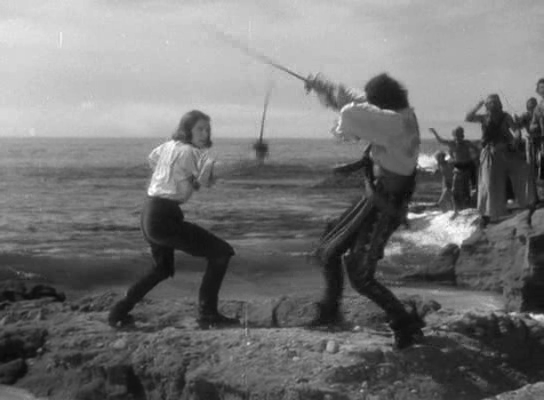A Century of Film is an ongoing series where Devin Wilger watches one movie from each year between 1917 and today. For the year of 1935, we have Captain Blood.
If you want evidence that filming for Captain Blood took place in the 1930s, when war was in the air and everyone knew it, look at how it’s bookended by speeches about liberating Britain from tyrants. For the briefest moments Captain Blood uses its marine setting to be a recruitment ad for the Royal Navy. It’s not a propaganda film, but it did come out the same year as Triumph of the Will, and for these brief moments it feels as though the people behind the camera had an idea of what was coming and a feeling that the Royal Navy might be a bit helpful when it inevitably did.
For the rest of the running time, between these bookends, we instead have a fairy typical pirate film, one that’s indebted to The Sea Hawk, an earlier film from this feature, in that it both steals plot points and stock footage. Again, we have the story of a wrongfully convicted man - this time Patrick Blood, portrayed by Errol Flynn in a star-making performance - sold into slavery, who becomes a pirate and eventually a hero. The execution here is a bit cleaner - Blood happens to be saving the life of someone rebelling against King James II instead of the convoluted murder plot of The Sea Hawk, for example - but it still follows the same rough narrative idea. The surest path to piracy is slavery, or so it is in Hollywood movies.
It’s quite a long path to piracy, even if it’s a direct one. Blood is owned by Arabella Bishop (Olivia de Havilland) after she buys him partially to spite her uncle, Colonel Bishop (Lionel Atwill), partially because she thinks he’s intriguing. He’s given some leeway as a slave because he’s really good at treating the gout of the governor of Port Royal (George Hassell), which means he can plan an escape, but this whole section takes about an hour, and while Captain Blood’s scheming is all well and good - and leads to a very intense sequence where all of his plans begin to fall apart - I felt about as trapped as the men in the film.
That does make the film earn the victory of the piracy scenes, the audience feels as liberated as the men as they steal a Spanish boat and set sail as free men. The film is monumentally better in the second half, with sea battles, a rivalry with a French captain (Basil Rathbone, who would eventually become Sherlock Holmes) which later becomes a beautifully shot duel and some actual spectacle. The first half sets up the many payoffs in the second, but I admit to becoming restless, I wanted to see some boats and derring-do.
At least I had Errol Flynn and Olivia de Havilland to keep me company until we got to that point. One look at Flynn and you know he’s a star, and you know he’s the perfect choice for a daring rogue character. His charisma is what sustains the film, you immediately understand why Blood can manage to lead an exceptionally loyal crew and can somehow manage to get power in Port Royal even as he’s a slave. Flynn is a magnetic actor, and even when the plot falls into handy coincidences - which it does often, including having the Spanish fleet salvage a foiled plan - one feels as though the universe itself is charmed by Flynn.
One also suspects that the first half was extended just to give Flynn and de Havilland more time on screen together. She’s also a great actor, but their chemistry adds a layer to their relationship that might not otherwise be there - one cannot imagine anyone else working in these roles because it feels as though Flynn and de Havilland will make out at any moment. Their relationship doesn’t have much grounding other than raw sexual chemistry.
Captain Blood is the kind of film that works because the right actors are on screen, it might be somewhat underwritten - though quite nicely directed, by the insanely prolific Michael Curtiz - but it has the right actors to make the film worth it even when the script is a bit weak. The Sea Hawk, did the same thing with the wrong actors, and it was difficult to watch. Captain Blood is a better movie not because of ten years of film advances - including sound - or because of the deft hand of the people behind the camera, but because the cast was perfect. The charisma of Errol Flynn and Olivia de Havilland have the ability to make you forget the many other flaws the film has.
Next time, we experience some good old fashioned Fury.




